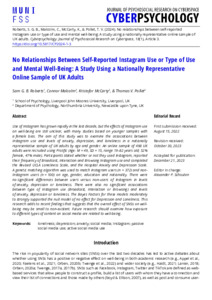Roberts, SGB  ORCID: 0000-0003-3986-0254, Malcolm, C, McCarty, K and Pollet, TV
(2024)
No relationships between self-reported Instagram use or type of use and mental well-being: A study using a nationally representative online sample of UK adults.
Cyberpsychology: Journal of Psychosocial Research on Cyberspace, 18 (1).
ISSN 1802 7962
ORCID: 0000-0003-3986-0254, Malcolm, C, McCarty, K and Pollet, TV
(2024)
No relationships between self-reported Instagram use or type of use and mental well-being: A study using a nationally representative online sample of UK adults.
Cyberpsychology: Journal of Psychosocial Research on Cyberspace, 18 (1).
ISSN 1802 7962
![No Relationships Between Self Reported Instagram Use or Type of Use and Mental WellBeing.pdf [thumbnail of No Relationships Between Self Reported Instagram Use or Type of Use and Mental WellBeing.pdf]](https://researchonline.ljmu.ac.uk/22291/1.hassmallThumbnailVersion/No%20Relationships%20Between%20Self%20Reported%20Instagram%20Use%20or%20Type%20of%20Use%20and%20Mental%20WellBeing.pdf)  Preview |
Text
No Relationships Between Self Reported Instagram Use or Type of Use and Mental WellBeing.pdf - Published Version Available under License Creative Commons Attribution Non-commercial Share Alike. Download (4MB) | Preview |
Abstract
Use of Instagram has grown rapidly in the last decade, but the effects of Instagram use on well-being are still unclear, with many studies based on younger samples with a female bias. The aim of this study was to examine the associations between Instagram use and levels of anxiety, depression, and loneliness in a nationally representative sample of UK adults by age and gender. An online sample of 498 UK adults were recruited using Prolific (Age: M = 49, SD = 15, range 19-82 years old; 52% female, 47% male). Participants stated whether or not they used Instagram, reported their frequency of Broadcast, Interaction and Browsing Instagram use and completed the Revised UCLA Loneliness Scale, and the Hospital Anxiety and Depression Scale. A genetic matching algorithm was used to match Instagram users (n= 372) and non-Instagram users (n = 100) on age, gender, education and nationality. There were no significant differences between users versus non-users of Instagram in levels of anxiety, depression or loneliness. There were also no significant associations between type of Instagram use (Broadcast, Interaction or Browsing) and levels of anxiety, depression or loneliness. The Bayes Factors for these models moderately to strongly supported the null model of no effect for Depression and Loneliness. This research adds to recent findings that suggests that the overall effect of SNSs on well-being may be small to non-existent. Future research should examine how exposure to different types of content on social media are related to well-being.
| Item Type: | Article |
|---|---|
| Subjects: | B Philosophy. Psychology. Religion > BF Psychology T Technology > T Technology (General) |
| Divisions: | Psychology (from Sep 2019) |
| Publisher: | Masaryk University |
| Date of acceptance: | 21 December 2023 |
| Date of first compliant Open Access: | 16 January 2024 |
| Date Deposited: | 16 Jan 2024 13:13 |
| Last Modified: | 04 Jul 2025 14:45 |
| DOI or ID number: | 10.5817/CP2024-1-3 |
| URI: | https://researchonline.ljmu.ac.uk/id/eprint/22291 |
 |
View Item |

 Export Citation
Export Citation Export Citation
Export Citation